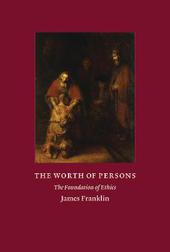
|
The Worth of Persons: The Foundation of Ethics
Hardback
Main Details
| Title |
The Worth of Persons: The Foundation of Ethics
|
| Authors and Contributors |
By (author) James Franklin
|
| Physical Properties |
| Format:Hardback | | Pages:288 | | Dimensions(mm): Height 228,Width 152 |
|
| Category/Genre | Ethics and moral philosophy |
|---|
| ISBN/Barcode |
9781641772785
|
| Classifications | Dewey:170 |
|---|
| Audience | |
|---|
|
Publishing Details |
| Publisher |
Encounter Books,USA
|
| Imprint |
Encounter Books,USA
|
| Publication Date |
8 December 2022 |
| Publication Country |
United States
|
Description
The death of a person is a tragedy while the explosion of a lifeless galaxy is a mere firework. The moral difference is grounded in the nature of humans: humans have intrinsic worth, a worth that makes their fate really matter. This is the worth that the Australian philosopher James Franklin proposes as the foundation of ethics. In The Worth of Persons he explains that ethics in the usual sense of right and wrong actions, rights and virtues, and how to live a good life, is founded on something more basic that is not itself about actions, namely the worth of persons. Human moral worth arises from certain properties that distinguish humans from the rest of creation (though some animals share a lesser degree of those properties): rationality, consciousness, the ability to act for reasons, emotional structure and love, individuality. This complex package makes humans the "piece of work" of which Hamlet says, "How noble in reason, how infinite in faculty." In clear prose and deeply informed philosophical argument, The Worth of Persons establishes a foundation for ethics in the equal worth of persons, which makes ethics absolutely objective and immune to relativist attacks because it is based on the metaphysical truth about humans. The Worth of Persons will appeal to all those who feel that endless debate about ethical dilemmas, rules, and principles fails to connect with what is really important ethically, that is, what makes humans matter.
Author Biography
James Franklin is the author of The Science of Conjecture: Evidence and Probability Before Pascal; Corrupting the Youth: A History of Philosophy in Australia; What Science Knows: And How It Knows It; and An Aristotelian Realist Philosophy of Mathematics. He is honorary professor at the University of New South Wales, Sydney, Australia, where he taught mathematics for nearly forty years and set up the world's first course on professional issues and ethics in mathematics. He is the editor of the Journal of the Australian Catholic Historical Society. He was awarded the 2005 Eureka Prize for Research in Ethics for work on the parallels between objectivity in mathematics and in ethics.
Reviews"Does the concept of the 'dignity' of persons really cut the ethical mustard? Franklin thinks it does. He argues that all the key ethical notions-rights, duties, virtues, vices, harms, consequences-derive their meaning from the idea of the 'dignity' (or 'worth') of persons. He articulates and defends a rich and complex conception of human worth, one which goes far beyond the current focus on the capacities for consciousness, willing and choosing, and includes our individuality and our emotional connectedness with others. In making his case, Franklin engages with today's main ethical theories-and theorists!-and does so in a engagingly crisp and persuasive manner." - Bernadette Tobin, director, Plunkett Centre for Ethics at Australian Catholic University "This accessible book puts forth a coherent and original theory of ethics by grounding ethics on the qualities of humans that make ethical decisions necessary. Ethics, Franklin explains, should not supply ready-made formulas for making choices, but rather deepen understanding about why dilemmas exist, and why choices matter. In clarifying that the foundation of ethics lies in the worth of persons, Franklin meets this challenge." -Aaron Rhodes, senior fellow, Common Sense Society, and author of The Debasement of Human Rights "A sound ethics must be grounded in a sound metaphysics, and specifically in an account of what makes human beings by nature radically different from anything else in the world. Philosophers once knew this, but in recent decades it has been forgotten, much to the detriment of moral theory. A new book defending the traditional view by a thinker of the caliber of James Franklin is a most welcome development." -Edward Feser, professor of philosophy, Pasadena City College
|